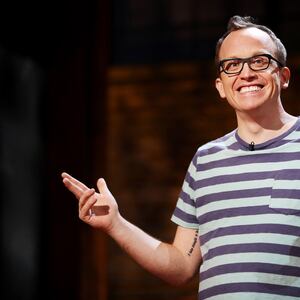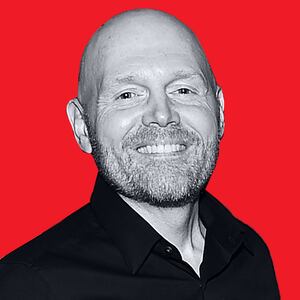BURBANK, California—Gary Gulman had just gotten out of the psych ward in the spring of 2017 when he found himself at a comedy club in Harvard Square. As he got up on stage to start telling jokes, he realized that he was “shaking significantly.”
“It was so clear that I was off,” Gulman tells me over coffee on a sunny September afternoon in Burbank. “I wasn’t talking at the same speed, in the same pitch that I normally do. My voice was very strained. So I had to address it because it was so obvious.” Before he could make people laugh, he realized, “I had to acknowledge that I was suffering.”
In video footage from that night, which opens The Great Depresh, his transcendent new combination stand-up special and documentary on HBO, Gulman sits on a stool and fiddles with the mic stand as he confesses to the crowd, “I have a mental illness. I have a severe mental illness. It’s excruciating.” He repeats, “It’s excruciating. This is like a cosmic bottom. This is like a bottom.”
No one laughs. “It’s the only special, I promise, that opens with the comedian bombing,” he says now.
At 46 years old, Gulman was just starting to emerge from the worst depressive period of his life. After his time in the mental hospital, he had moved back into his childhood bedroom in his mother’s house in Peabody, Massachusetts. He got a job as a camp counselor for adolescents just so that he would have a reason to get out of bed every day. He wasn’t sure if he could ever be funny again.
Two years later, Gulman arrives at the Coffee Commissary in Burbank looking tanned and happy with his own reusable Starbucks cup in hand. A long time vegan, he orders an iced coffee black and folds his towering 6'6" frame into a small patio chair. In one bit I’ve heard him tell on stage, he explains how much he hates it when baristas ask if he wants “room” for milk. “No, I don’t want you to steal six sips,” he jokes.
He’s just left a meeting at NBC Universal, one of several he’ll be attending during his week in Los Angeles with executives who are potentially interested in adapting his story into a film or TV show.
When I tell Gulman how much I enjoyed the new special, he seems unusually grateful. “I cannot tell you how many people I’ve met with this week who haven’t watched it,” he says, an air of disappointment in his voice.
“I’ve always wanted to talk about my experience with depression,” he says of his decision to start telling jokes about what he went through on stage. He worried that his audience wouldn’t “tolerate a heavier, deeper show” and that he didn’t personally have “the skill to pull it off.”
As he started to work out new material on the road, he felt himself starting to feel better—thanks in large part to antidepressants and therapy. “Was I doing better work because I was feeling better?” he asks himself. “Or was I feeling better because I was doing better work? I think I can objectively say that I was doing better work because I was feeling better.”
He ultimately had to learn to dissociate his mood from his successes or failures as a comedian. “For too long, my entire mood was based on my last show,” Gulman says. Because he was trying out such “risky” material about depression, he says he “bombed a lot” along the way.
When Gulman left New York City to move back home, he didn’t think he’d be back. “I thought that best case I would feel better and realize that New York was too stressful,” he says. It was his manager’s idea that he sit down with director Michael Bonfiglio, who previously directed Jerry Seinfeld’s recent special-documentary hybrid, to talk about doing something similar focused on his recovery. They met the day after Gulman finally returned to New York in May 2018.
Bonfiglio said he was interested but asked Gulman, “Do you mind if I run this idea by my friend Judd Apatow?”
“Yeah, of course,” Gulman recalls answering, joking, “Thank you for asking.”
Apatow, who ended up signing on as a producer, gave Gulman “a lot of notes” during the process but the one that sticks with him came on the night of the taping in Brooklyn. “I was pretty nervous and this was the culmination of a lot of work,” Gulman says. Apatow told him, “Treat this like a film. If you flub a line, just start it over.” The only time he had to do that was during the part of the show where he lists every antidepressant he’s ever taken.
“You know what my job as a producer was?” Apatow said on stage with Gulman at the Largo theater in Los Angeles during an event to promote the special this past week. “When we were choosing which section of you bombing to use, I was the person going, ‘Not bad enough! Sadder! Worse! Let’s see it in his eyes.’” In a more sincere moment, Apatow praised Gulman for writing “such an incredible” piece of comedy about his experience.
The bit that closes The Great Depresh is about how you know you’re depressed when you’re eating ice cream with a fork because you couldn’t bring yourself to wash a spoon. Gulman actually told a version of that joke on The Late Show with Stephen Colbert in early 2017. But at that time he didn’t mention that he was depressed.
“People say, why don’t you wash a spoon?” Gulman says in the bit. He answers that question with, “Why don’t I shower?” It’s funny enough on Colbert but takes on a whole new depth when he gets to it in the special.
“Those were the only five minutes I had written in two and a half years,” he tells me. In early versions of the hour he would start with the ice cream bit and get some easier laughs before heading into the darker material about depression. But in the final product, which will air on HBO this Saturday night, Oct. 5, he dives right in.
After explaining that it’s been five years since he shot his last special, Gulman says, “The reason is that I got very sick with the depresh.” The first really big laughs come when Gulman jokes that growing up in the ’70s, “The only antidepressants we had access to was ‘snap out of it’ and ‘what have you got to be depressed about?’ That was the second-leading brand of antidepressant.”
At another point, he jokes that he got recognized almost immediately upon entering a psych ward. “Are you Gary Gulman or am I crazy?” one fellow patient asked him.
There is a long history—one that has become almost cliché—of comedians suffering from depression, as well as a disturbing incidence of suicide. There’s even a podcast about it, The Hilarious World of Depression, on which Gulman was a guest about two years ago. This year’s Clusterfest comedy festival in San Francisco featured a panel on “Comedy and Mental Health” where comics Jeff Ross, Tig Notaro, Neal Brennan and Michelle Buteau discussed how they cope with depression. And later this fall, Rainn Wilson’s SoulPancake platform, in collaboration with Funny or Die, will release a short documentary called Laughing Matters in which comedians like Sarah Silverman, Wayne Brady and Chris Gethard open up about their mental health struggles.
Gulman doesn’t think that comedians are necessarily more susceptible to depression but he does believe that they are more likely to be “honest and vulnerable” about their suffering.
At Largo, Gulman and Apatow were joined by fellow comedians Patton Oswalt and Maria Bamford, who has been talking about living with bipolar disorder on stage for years and made it a central part of her Netflix series Lady Dynamite. Bamford thinks stand-up comedy is a “great thing for somebody with mental health issues” because comedians are used to “talking about everything openly.”
“I always felt like I was a very shy person who had a very difficult time speaking extemporaneously or jumping into conversations,” she said, before joking, “Of course not now—fully medicated!” She added, “So stand-up was this perfect thing where I get to totally be myself and say exactly what I want to say even if nobody wants me to.”
On the other hand, Gethard warns in Laughing Matters, “Comedy is not going to save you. And if you are thinking about doing comedy as a substitute for therapy, it doesn’t work. I tried for a long time.”
When Gulman first started performing stand-up in Boston in 1993, he had already been in therapy and on antidepressants. During his college years, he would sneak in and out of his therapist’s office so no one saw him. He even kept it a secret from his girlfriend because he thought she would be “embarrassed” and break up with him.
The first time he heard a fellow comedian talk about being on Prozac he was “shocked.” He was “in awe” that someone was “so brave to admit that she is on antidepressants” because it was such a taboo subject. He was similarly amazed while growing up watching comedian Richard Lewis talk openly about his neuroses.
“I don’t know that comedians are any more likely to be depressed,” he says, “but they are more likely to talk about it with strangers and it’s either bravery or sheer gall, brazenness that causes them to do it.”
There’s also a myth in the comedy world that if you medicate your depression, you’ll stop being funny. Gulman says he “had enough experience” in his own life with “suffering and the human condition” by the time he went on antidepressants that he had plenty of material to draw on for his comedy. “It’s a romantic myth, ‘I need to be troubled to write well,’” he says. “But it’s not true.”
On Dec. 30 last year, Gulman had consumed too many cups of coffee when he had an idea. “While the coffee was still giving me confidence, I made a huge commitment,” he says. He typed out a tweet: “Starting Jan. 1 I am going to give one joke writing tip each day. I can’t promise they will be effective but they will have worked for me.”
“I should have said one a week,” he says with a laugh. But he has stuck with it, imparting one piece of advice aimed at young or struggling comedians every day since. He began on Jan. 1 with, “Record every set. The hard part: Listen to it and transcribe everything you want to say again. It’s sometimes depressing but it gets you to do the hardest part which is to sit down and write. Usually you’ll think of something to add or change. This works for me.”
Last week, he wrote, “Whenever you have a showcase or audition or TV appearance, spend whatever you have to to look right. Arrive early and prepared and if your hands shake when you’re excited get a prescription for a beta blocker. I use propanolol.”
He plans to keep doing it until Dec. 31 “and then never mention it again.”
At one point in the special, Gulman says, “I’m only comfortable talking about it now because I’ve come out the other side.” When I ask if he still feels depressed, he says, “I don’t feel any most days, these days,” he says. “But there was a time when there was a low level for months and months on end.”
“I’ve had episodes of depression since I’ve known myself,” he says. “Since 7 years old I can remember having these feelings. The episodes would never last more than a few months. This one lasted for two and a half years.” Since he went into remission in the fall of 2017, he says he’s had the “longest, sturdiest recovery” of his life. “But it’s in part because I’ve adopted 18 or 20 things that I do every day to stay this way. I’ve never been more vigilant because I’ve never fallen that far.”
Despite all of this—or perhaps because of it—The Great Depresh manages to be the funniest stand-up special I’ve seen this year. And it comes on the heels of more flashy offerings on Netflix from Dave Chappelle and Gulman’s fellow Boston comic Bill Burr, who are deliberately pushing boundaries in a very different way. Whereas Gulman is finding new ways to make depression funny, those comics are telling outrage-inducing jokes about Michael Jackson or Michelle Obama.
Gulman’s sensitive special serves as an antidote to their anti-woke comedy.
While those comics rail against millennials for being too sensitive, Gulman says he “admires” them, joking, “Your stance on bullying is to be commended.” He even comes out in favor of “participation trophies.” His “only quibble” with millennials, he jokes, is that they have altered the word “literally” to also mean “figuratively.”
“One thing is I’m married to a millennial and I’m very impressed with her perspective,” Gulman tells me of his wife Sade (“not the Sade,” he jokes on stage). “Growing up in Massachusetts as a boy, and a sensitive one, the men in my life were saying, ‘We need to make you more aggressive, we need to toughen you up.’” His football coaches would say things like, “If you were more aggressive, there would be no stopping you.”
“That didn’t work on me and I paid a price for it in my psyche,” he says. “I was always hiding things about myself and keeping things secret. Name-calling and bullying, either physical or verbal, was very painful for me growing up and when I saw the stance that millennials seem to be taking, I don’t have nostalgia for that. I could have used some more nurturing than I got and it just happened to be the generation I grew up in. We were just so mean to each other.”
Gulman thinks that some of his fellow comics may view sensitivity as “a sign of weakness.” But he thinks “it takes some strength to be soft.” He has a piece in his act now in which he makes fun of other middle-aged white male comics who like to complain that “you can’t say anything anymore.”
This divide between more sensitive comics and those on the other side was laid bare this past month during the uproar over Shane Gillis, a stand-up who was hired by Saturday Night Live and then fired just days later after racist and homophobic remarks he had recently made were brought to light. Among them was a riff on his podcast in which he used homophobic slurs to describe both Judd Apatow and Chris Gethard, who released his own HBO special about depression called Career Suicide two years ago.
“Yeah, I get called a snowflake a lot,” Gulman says. “So I’m used to that.”
When he hears comedians talk about how sensitive the audience is, he thinks they should look in the mirror. “I find it ironic because I know comedians,” he says. “In order to do this, look at what I do. I spend my days overreacting to petty injustices and then I race around New York City every night sharing these small slights with complete strangers. It’s the epitome of being sensitive.”
“I get it,” he continues. “It hurts when an audience groans at something you say. But at the same time, I’m as sensitive as the audience is.”
Gulman has never been more honest and personal in his comedy than he is on The Great Depresh. But he says he did so “out of necessity.” A long time ago, his therapist told him something that he only “internalized” recently: “If you’re an open book, then nobody has anything on you. Nobody can expose you.” Up until a few months ago, only a handful of people knew he had been in the hospital and “now everyone will know.”
When people watch The Great Depresh, Gulman hopes it will make them see that depression is an “illness” and not a “character flaw.” He wants to stop hearing, “That’s just life. You get sad and you get nervous and it’s just stress.”
“I knew that I had enough to be happy on paper,” he says. “But not only was I not happy but I hated myself and couldn’t get out of bed. That wasn’t necessary. There’s treatment.”
Throughout his career, Gulman has known that what makes his type of observational comedy work is that the laughs “come from a place of recognition.” He worried that his experience with depression would be “too obscure” for audiences to truly understand. Ultimately, the opposite was true. He thought he was the only one who knew what it was like to “hit bottom, both literally and millennial literally” when finishing a full pint of ice cream. But the laughter of the crowd proved he was not alone.
In the final moments of the special, Gulman arrives at a moment of sincerity. “If you are suffering from a mental illness, I promise you are not alone. You are not alone,” he tells the audience. After the applause dies down, he adds, “I’m sorry, you are alone, but only because you can’t leave the house today. But you should.”




